September 5, 2008
Air Date: September 5, 2008
FULL SHOW
SEGMENTS
Drill Baby, Drill
/ Jeff YoungView the page for this story
If there was one environmental message that resounded often and loudly at the Republican National Convention it’s that drilling is the key to energy independence. Living on Earth host Steve Curwood talks with Washington correspondent Jeff Young from the convention floor in St. Paul, Minnesota, about whether presidential hopeful John McCain’s environmental views are changing and gravitating to those of his Republican base. (06:30)
Palin's Record
View the page for this story
Living On Earth host Steve Curwood asks Joe Geldhof, Alaska coordinator for Republicans for Environmental Protection, about vice presidential candidate and Alaska Governor Sarah Palin’s record on the environment.. (05:30)
Voices of Dissent
View the page for this story
Protesters took to the streets of St. Paul to speak out against the Republican Administration's policies on war and the environment. (01:30)
On Home Turf
/ Ingrid LobetView the page for this story
Much has been reported over the years on Senator John McCain's record on national energy issues, but what about his record in Arizona, the state he's represented for two and a half decades? Living On Earth's Ingrid Lobet went to Arizona to look at McCain's record in his dry, mineral-rich state, where most of the land is either public or Indian-owned. (16:30)
What Wall Street Wants
View the page for this story
The clean energy future Republicans describe in their platform will require big investments in renewable energy sources. Host Steve Curwood talks with Michael Hoffman, managing director for Riverstone Holdings LLC, about the Republicans' green pledges and what Wall Street wants from a new administration. (05:00)
Peering into the Platform
View the page for this story
Host Steve Curwood talks with James Woolsey, energy advisor to John McCain and former head of the CIA, about John McCain’s commitment to nuclear power, as well as a cap and trade system to reduce global warming emissions and why some of the senator’s views don’t quite square up with the Republican environment platform. (04:30)
Greening the Twin Cities
/ Bobby BascombView the page for this story
Free bikes, neighborhood cleanups, and renewable energy were all part of the green agenda for the Republican National Convention. As Living on Earth's Bobby Bascomb reports, the city of St. Paul may see some long-term benefits, too. (05:00)
Convention Wrap-Up
/ Jeff YoungView the page for this story
Host Steve Curwood and Jeff Young discuss whether Senator McCain’s message to take action on climate change is being drowned out by the Republican party base’s battle cry: “Drill, baby, drill!” (02:30)
Show Credits and Funders
Show Transcript
HOST: Steve Curwood
GUESTS: Joe Geldhof, Michael Hoffman, Jim Woolsey
REPORTERS: Bobby Bascomb, Ingrid Lobet, Jeff Young
[THEME]
CURWOOD: From Public Radio International, this is Living on Earth.
[THEME]
CURWOOD: I’m Steve Curwood.
GIULIANI: Drill baby drill!! Drill now!
CURWOOD: That was the message -- loud, clear and frequently repeated -- from the rafters of the GOP convention center in Minnesota, and from the top of the presidential ticket.
MCCAIN: We’ll produce more energy at home. We will drill new wells offshore, and we’ll drill them now -- we’ll drill them now!
[APPLAUSE]
CURWOOD: And the words were echoed by John McCain’s pick for vice-president, the Alaska Governor, Sarah Palin.
PALIN: Americans: we need to produce more of our own oil and gas, and take it from a gal who knows the North Slope of Alaska, we’ve got lots of both.
CURWOOD: Republicans, energy independence, and the environment -- We’ll have those issues and much more this week on Living on Earth. So stick around!
Drill Baby, Drill
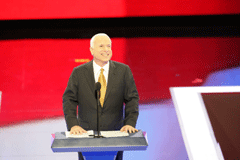
Republican presidential candidate John McCain. (Courtesy of 2008 Republican National Convention and Reflections Photography)
[NPR NEWSCAST MUSIC: Boards Of Canada “Zoetrope” from “In A Beautiful Place Out In The Country” (Warp Records 2000)]
ANNOUNCER: Support for Living On Earth comes from the National Science Foundation and Stonyfield Farm.
[THEME]
CURWOOD: From the Jennifer and Ted Stanley studios in Somerville, Massachusetts, This is Living on Earth. I'm Steve Curwood.
When Arizona Senator John McCain accepted the Republican nomination in St. Paul to be president of the United States he promised to embark on the most ambitious national project in decades, bringing energy production home.
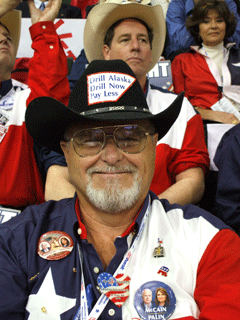
This Republican delegate's hat reads "Drill Alaska, Drill Now, Pay Less." (Photo: Bobby Bascomb)
[APPLAUSE]
MCCAIN: My friends, we’ll build more nuclear power plants. We’ll develop clean coal technology. We’ll increase the use of wind, tide, solar and natural gas. We’ll encourage the development and use of flex fuel, hybrid and electric automobiles.
[APPLAUSE]
CURWOOD: And McCain says if Americans want to stop sending $700 billion every year for energy to unfriendly nations and protect the planet, they should vote Republican.
[APPLAUSE]
MCCAIN: Senator Obama thinks we can achieve energy independence without more drilling and without more nuclear power. But Americans know better than that.
[APPLAUSE]
MCCAIN: We must use all resources and develop all technologies necessary to rescue our economy from the damage caused by rising oil prices and restore the health of our planet.

(Courtesy of 2008 Republican National Convention and Reflections Photography)
YOUNG: Hi, Steve
CURWOOD: So Jeff, you were in St. Paul, and there John McCain, the self-styled maverick, who likes to remind voters that he stood up to his own party’s leaders when it came to climate change, has a problem right? He needed to mend fences with the party’s base if he’s going to turn out the conservative votes, and that sets up a rather tricky dance for him. How did his feet move?
YOUNG: Well, if it was a dance, I would say that the leading partner at this point is the party’s base, not Senator McCain. One of the big questions hanging over the McCain campaign all summer has been, is McCain moving Republicans toward action on climate change or is the party pulling him the other way, toward traditional support for oil and fossil fuels?
CURWOOD: And the answer is?
YOUNG: Well, you know, we did hear Senator McCain talk about plans for clean energy, but he used the phrases oil, drilling and nuclear energy ten times. The words climate change or global warming never passed his lips, in the acceptance speech. In fact, all week only one prime time speaker here at the convention used the phrase global warming, and that speaker was Joe Lieberman, who, of course, is not a Republican. Now as you pointed out Senator McCain’s platform does include a cap and trade system to cut greenhouse gas emissions. I’ve seen nothing to indicate he’s changed his position. But what has changed, I think, is that there is now little emphasis on that, and that kind of rhetoric, I would argue, matters -- because the campaign, the convention, these are the tools that a candidate has to build a mandate for support for the platform, and I simply did not see that happening here.
CURWOOD: Now Jeff, there are a lot of stars in the Republican party who take global warming pretty seriously, people like California governor Arnold Schwarzenegger. What happened to them?
YOUNG: Well they just weren’t here. They had pretty good excuses for their absences. Governor Schwarzenegger is in a budget battle back in the state capitol. Florida’s governor Charlie Crist, another climate change champion in the party, he had to stay home to prepare for a hurricane. Their views, as a result, were not on display here. So instead, the big moments on energy came from speakers like former New York mayor Rudy Giuliani and former Massachusetts governor Mitt Romney.
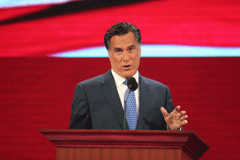
Mitt Romney. (Courtesy of 2008 Republican National Convention and Reflections Photography)
[APPLAUSE]
ROMNEY: And I have one more recommendation for energy conservation: let’s keep Al Gore’s private jet on the ground.
[APPLAUSE]
GIULIANI: He will lead us to energy independence so we can be free of foreign oil.
[APPLAUSE]
GIULIANI: And he’ll do it with an all-of-the-above approach including nuclear power, and yes, offshore oil drilling.
[APPLAUSE AND CHANTING OF “DRILL, BABY, DRILL”]
GIULIANI: Drill, baby, drill? (laughs) Drill, baby, drill!
[APPLAUSE AND MORE CHANTING]
CURWOOD: So there’s a new chant, eh? Drill, baby, drill.
YOUNG: Yeah, and, in fact, that showed up the very next day on some T-shirts.
CURWOOD: But wasn’t Senator McCain opposed to offshore drilling not so long ago?
YOUNG: Oh, yeah, I mean it was just mid June that he changed his position on drilling, and that change has paid off for him politically. He seems to be in sync with a shift in public opinion. It also coincides with a pretty significant up-tick in his fundraising. McCain is now by far the largest recipient of campaign contributions from the oil and gas industry -- more than $1.5 million so far, and that’s more than three times what Obama has taken from the industry.
CURWOOD: And I expect that that’s helped get him back in good graces with the party’s conservative base, huh?
YOUNG: Oh, definitely. You know I spent some time walking the floor here asking delegates what they think the energy priorities should be, and I definitely get the feeling that conservative party members think that McCain has moved their way.
RUTLEDGE: Drill here, drill now, pay less. My name is Hollis Rutledge from south Texas.
BURKHART: My name is June Burkhart. I’m from Willow, Alaska. We would like to see him come over and change his thoughts a little bit on opening ANWR so we can get the gas and oil reserves down to the people. He has not been in favor of that, but now that our governor is going to become vice president, there may be some changes there.
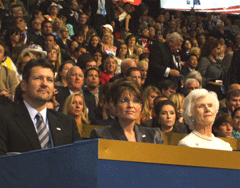
Alaska Governor Sarah Palin between her husband and John McCain's mother. (Photo: Bobby Bascomb)
YOUNG: Oh yeah, and I think Senator McCain’s choice here of Sarah Palin really tells us a lot about his priorities. You know, he had a lot of people on the short list in consideration for vice president who had pretty strong records on addressing climate change, supporting alternative energy, and instead he went with the Alaska governor who strongly supports expanding oil and gas drilling and who, frankly, has a spotty record on climate change.
CURWOOD: Jeff, we’ll get back to you later. Let’s hear now from Governor Palin’s speech.
Related links:
- Republican National Convention
- To listen to Steve Curwood talk with Senator McCain about climate change last year, click here
- To learn more about the environment in this election, check out Living on Earth's previous election coverage
Palin's Record
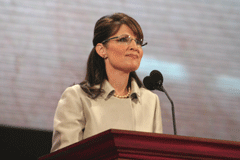
Alaska Governor Sarah Palin speaking at the Republican National Convention in St. Paul. (Courtesy of 2008 Republican National Convention and Reflections Photography)
PALIN: Americans, we need to produce more of our own oil and gas.
[APPLAUSE]
PALIN: And take it from a gal who knows the north slope of Alaska, we’ve got lots of both.
[APPLAUSE]
PALIN: Starting in January in a McCain/Palin administration, we’re going to lay more pipelines and build more nuclear plants, and create jobs with clean coal and move forward on solar, wind, geothermal and other alternative sources.
[APPLAUSE]
CURWOOD: Sarah Palin governs a state defined by its natural wealth: gold and zinc, forests, fish and caribou, as well as oil and gas. And perhaps most important -- the state bearing witness to the strongest climate change effects -- vanishing ice and eroding coastline.
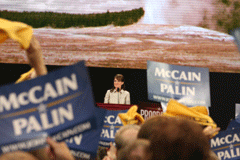
Alaska Governor Sarah Palin speaking at the RNC. (Courtesy of 2008 Republican National Convention and Reflections Photography)
GELDHOF: Nice to be here.
CURWOOD: Alaska’s a front line of climate change. We have whole villages that are falling into the sea, people are having to leave them, the sea ice is vanishing. What’s Sarah Palin’s record on climate change? You look at some of the documents, and it appears that she thinks that this is not a human problem, not a human-caused problem.
GELDHOF: She, like virtually everyone in Alaska, acknowledges that there are significant and widespread changes to Alaska in terms of the polar ice, to the permafrost, the impact on wildlife. I think she, like a lot of the politicians up here, they don’t know exactly what the causal effect is, or they say they don’t know. They’re very reluctant to place blame, as it were, on human activities.
CURWOOD: Joe, you follow Governor Palin’s career. How green a vice president do you think she would be? As I understand it, when she defeated Frank Murkowski for the Governorship two years ago she played hardball with the gas and oil companies. What does that tell us about her?
GELDHOF: From the point of view of corporate America, she’s a renegade. It would be wrong to think she’s some environmentalist who’s against the oil and gas industry. This is a candidate, as governor, who really wanted to develop Alaska’s gas and oil resources. But when it came to the taxation side, she wanted to tax the oil, and she wanted to make sure -- and did make sure -- that the state of Alaska and the citizens up here got substantially more revenue from their oil resources. And that put her at huge odds with people in London and Texas.
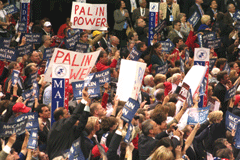
Palin supporters watch her speech. (Courtesy of 2008 Republican National Convention and Reflections Photography)
GELDHOF: Well she has been a real breath of fresh air, particularly compared to the previous governor who just absolutely followed the forest products industry party line, right down to the end, and wanted to accelerate cutting in the Tongass. In that sense, Sarah Palin has been much more like Theodore Roosevelt who I mention because he actually created the Alexander Archipelago Forest Reserve back in the day when he was President, and it later became the Tongass. But she’s working and having her staff work on a sustainable basis so they bring together environmental groups and community leaders and people from the forest service and forest products industry and try to reach some sort of consensus on small-scale logging to keep the few remaining saw mills open. But Sarah Palin has basically acknowledged the days of having these huge dissolving sulfite pulp mills are gone.
CURWOOD: Joe, I thought I heard you compare her to Theodore Roosevelt.
GELDHOF: Well, at least on the timber stuff, in the Tongass.
CURWOOD: So, Joe, is it fair to say from your perspective, you’d see Sarah Palin in office an improvement over what the Bush administration has done in terms of environmental protection and natural areas and that sort of thing?

(Courtesy of 2008 Republican National Convention and Reflections Photography)
CURWOOD: Joe Geldhof is an attorney in Juneau and the Alaska representative for Republicans for Environmental Protection. Thanks for taking this time with us today, Joe.
GELDHOF: Okay, good luck.
Related link:
Check out LOE's previous election coverage here
[MUSIC: Marc Ribot “Todo El Mundo Es Kitsch” from Party Intellectuals (Pi Records 2008)]
Voices of Dissent

A protester concerned with global warming and polar bear habitat. (Photo: Bobby Bascomb)
CURWOOD: It's Living on Earth, I'm Steve Curwood.
[MUSIC AND CROWD]
CURWOOD: Political conventions draw protestors, and the liveliest crowds tend to demonstrate at the gathering of the party that holds the White House, and this year was no exception. While there were a few signs and some street theatre during the Democratic gathering in Denver, there were full-scale marches and some spots of violence at the Republican event in St. Paul. And some of the demonstrators had the environment on their minds. Living on Earth’s convention team caught up with a few of them.
LEIERWOOD: My name is Mina Leierwood, and I’m from Minneapolis. I’m dressed up as a polar bear today. I’ve got my polar bear headdress and my face paint and my white outfit, and I’m very concerned about the vice presidential pick for presidential contender McCain. She doesn’t believe in global warming. She wants to drill in the Arctic National Wildlife Refugee. That’s one of our places we like to live as polar bears. And she likes hunting, so I’m scared of her.

Protesters at the Republican National Convention in St. Paul, Minnesota.(Photo: Bobby Bascomb)
COLLEEN: My name is Colleen, and I’m from Waukesha, Wisconsin. I’m out here today talking about America standing for everyone. We need to get back to making America strong. Alternate types of energy, no more oil, no drilling, no oil. Getting off of oil as soon and as quickly as possible.
[MUSIC AND CROWD]
CURWOOD: Those voices from the Twin Cities were recorded by our convention team, Bobby Bascomb and Jeff Young.
On Home Turf
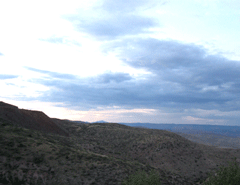
Near Jerome, Arizona. (Photo: Ingrid Lobet)
During this campaign we’ve looked at John McCain's record as a national legislator in some degree of detail. But as part of Arizona’s delegation to Congress since 1982, what’s his record in terms of advancing energy and environmental protection on behalf of his state, with its vast public lands and national parks, including the Grand Canyon? Living On Earth's Ingrid Lobet looks at the causes the would-be president took on at home … in a state with 25 percent Indian land, a fast growing population and growing concerns over water.
[WALKING ON DESERT SOIL AND QUIET BIRDS]
BEATTIE: That’s the creosote bush and when it rains it's like the best desert smell on the entire planet.
LOBET: Tina Beattie picks her way over rocky ground in the dramatic Superstition Mountains, east of Phoenix. She grew up right near here. Now she's Arizona coordinator for Republicans for Environmental Protection.
BEATTIE: The great thing about the Superstition Mountains is they're just incredibly majestic: just huge, massive rock structure. Out here you know you have the saguaros and ocotillos and creosote and Palo Verde. So it's all the beautiful plants of Arizona, juxtaposed with kind of this rugged rockiness.
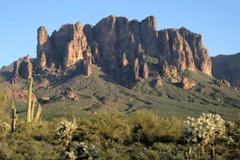
The Superstition Mountains near Phoenix, Arizona. (Photo: Jake Haskell)
BEATTIE: You know as a kid you're not thinking ‘Boy, I hope some very forward thinking politician is protecting all this for my kids.' But as an adult, that level of protection for this area -- I bring my 10-year-old stepson out here, and expose him to what he doesn't get just 20 miles away where we live.
LOBET: Not long after this wilderness was expanded, McCain helped Udall pass another major bill, the Arizona Desert Wilderness Act of 1990, protecting another 2.4 million acres. No fewer than 78 areas of wilderness were created under these two laws.
McCain says when he went to Congress from the military, he was on the far right. But Democrat Morris Udall, who chaired the then House Interior Committee, reached out to him, inviting him to press conferences, treating him publicly with respect. In this oral history recorded for the University of Arizona, McCain says that taught him allies could be found in either party.
MCCAIN: He and I flew over, walked over, drove over huge amounts of the state of Arizona when we were doing these wilderness bills and had tens of hearings that were long ones, so we could hear from everybody. That certainly had an impact on me.
LOBET: Those years also saw controversy over aircraft noise in the Grand Canyon. Rob Smith of the Sierra Club credits McCain with the law that returned a measure of peace to the iconic park.
SMITH: There are almost a hundred thousand aircraft flights of just tourist airplanes that rain noise down on the Grand Canyon, and it used to be they would fly everywhere including all the way down to the river level a mile below the rim.
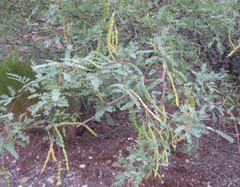
Velvet Mesquite, Clarkdale, AZ. (Photo: Ingrid Lobet)
LOBET: In his Phoenix office, Smith points to a wall map of Arizona that shows more than half the state is public land. The Sierra Club worked with McCain on land issues earlier in his career. But when Smith looks at the Senator's whole record, what he sees is mixed:
SMITH: It's always worth asking and always worth talking to him about environmental issues, but you're never sure which one he's going to pick up on. If it's about the Grand Canyon, he's generally been pretty good. If it's about national park protection in other places, his vote you couldn't count on. When no one was doing anything, he was proposing higher miles per gallon for cars, which would save fuel. But when the key votes came in this last Congress, last year, he couldn't be found.
LOBET: The origin of the word Arizona is uncertain but it's hard to ignore its similarity to the Spanish words for a dry, arid place, una zona árida.
Arizona is the second fastest growing state in the nation. Americans and new immigrants are rushing to a sun-seared part of the country where water is scarce. Builders keep creating dreams in the desert and each new household sticks its straw in the ground. It puts a lot of pressure on streams, and on underground water.
[QUAIL AND INSECTS]
ADAMS: Coming up here I really didn't know what I was getting into. I’d been in the city for a long time so I’d kind of lost touch with being from the country.
LOBET: A rabbit sprints from mesquite to mesquite. Quail are hiding. Dr. Richard Adams stands at the pipe that marks his well, the source of water for a family of four that left Phoenix and moved to the country.
ADAMS: So the idea that we would run out of water just really never crossed my mind.
LOBET: But that's what happened. Adams was home from work. He was watering a plant, when the hose pressure weakened… then was gone. This beautiful adobe custom home …and no water.
ADAMS: It's kind of I think an epiphany…. Kind of like when I heard that my mom was ill, actually I saw her, she came up and I was in residency and I put a chest x-ray up and I saw her, and I just went, 'Whoa, this is real.' That was the kind of feeling.
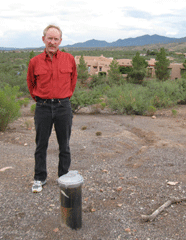
Dr. Richard Adams beside the well he had to deepen. (Photo: Ingrid Lobet)
ADAMS: When I was down there, everybody had a pool. I certainly spent more time cleaning it than swimming in it. Anyway I just took water for granted. And I don't do that anymore.
LOBET: And will this experience rise to the level of voting issue in November?
ADAMS: Yeah, environmental issues are going to play into how I vote. Absolutely.
LOBET: The McCains own a home just over the hill from here in Cornville, AZ. So Dr. Adams assumes that the Senator understands the fragility of water. But he doesn't say if McCain will get his vote.
John McCain hasn't focused much on Arizona water issues. But Tina Beattie says she doesn't fault him for that. She says it's a concern that would have to rise up from Arizonans themselves. So far it hasn't.
BEATTIE: We're probably the only western state that hasn't seen water restrictions, which is a little nutty. I've never not been able to water my lawn or anything like that. Our water is cheap so we don’t really have a financial incentive to conserve.
LOBET: But the Sierra Club's Rob Smith says it IS incumbent on leaders to recognize that water use in the state is unsustainable and to conserve it for people and wildlife, even if the issue isn't front and center for voters. And though many water decisions are made at the local level, Smith believes the senator could have done more.
SMITH: McCain has expressed some concern and interest in maintaining streams, but really hasn't proposed strong measures to really preserve those stream flows the way we think they need to be.
For instance, the designation Wild and Scenic River could maintain stream flows along a stretch of river. That has been proposed for the Upper Verde River but that bill has not been introduced. That is something a senator could have done.
LOBET: Senator McCain has been outspoken on energy policy, leading on climate change earlier this decade. His approach emphasizes nuclear power.
This being mining country, silver, gold and copper interests have wielded enormous political influence in Arizona for decades. The Grand Canyon itself lies surrounded by rocks rich in uranium, the raw material for firing nuclear power plants. Rob Smith and others point out, that's a subject McCain has not been eager to discuss.
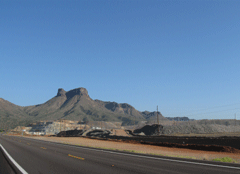
The Asarco-operated Ray open pit copper mine in Hayden, AZ. (Photo: Ingrid Lobet)
LOBET: That issue has been of particular interest to Arizona Democratic Congressman Raul Grijalva, who occupies Mo Udall's old seat. He hoped he might be able to work together with McCain to keep uranium mining away from the Grand Canyon.
GRIJALVA: You know in four years we went from having 11 permits to mine in the Grand Canyon, to over a thousand – they’re just expedited, given to people immediately.
The difference here is that it is the Grand Canyon, and we felt that this, the icon of our national parks, a world icon, seven natural wonders of the world, is eminently threatened by this uranium mining. And so we’re not saying that you can't mine for uranium in some other piece of public land. We are saying this is sacred for a lot of reasons and we want to protect it.
LOBET: But McCain hasn't addressed the new uranium claims near the national park. Congressman Grijalva says he also wanted to work with McCain on the extensive pollution left behind by old gold, copper and uranium mines in the West, and to make sure the same thing doesn't happen with the new mining boom now underway. Those reform efforts were thwarted by a Democrat, not a Republican--that was Senator Harry Reid of Nevada--but Grijalva says Senator McCain should be more forthcoming about where he stands on western mining.
GRIJALVA: You know, running for the highest position in this nation and the world, his attitude about the protection of the Grand Canyon, his attitude about how we balance public lands resource protection with resource extraction, I think those are valid issue that he needs to talk about.
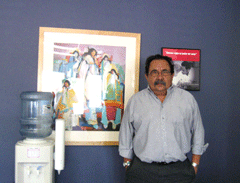
Congressman Raúl Grijalva (D) of Arizona's 7th District. (Photo: Ingrid Lobet)
[WATER FEATURE AND FAINT MUSIC]
LOBET: Visitors enjoy the lobby in the five-star Wild Horse Pass Resort on the Gila River Indian Reservation. Attorney Steve Heeley is Pottawatomi and has long represented the tribes here. He also worked with John McCain for years in Congress. He says in the 1980s, the Environmental Protection Agency still hadn't worked out its relationship with tribes, and that meant problems on tribal lands.
HEELEY: So you had these holes, and if we take Arizona as an example, 25 percent of the state of Arizona was under the control of Indian tribes and those 25 percent of the lands weren’t receiving the level of protections they were entitled to.
LOBET: As chair of the Senate Indian Affairs Committee, John McCain helped tribes get the power and funding to set their own environmental standards, Heeley says. McCain was also committed to helping tribes develop businesses on reservations in the days before widespread Indian gaming.
HEELEY: Senator McCain was very interested in addressing issues regarding economic development in Indian country. There was lot of poverty, overwhelming infrastructure needs, so senator McCain focused on trying to provide incentives for businesses to locate on reservations, and to hire Natives to work in those facilities.
LOBET: And Steve Heeley says the work was always a collaboration of Democrats and Republicans on the Committee.
HEELEY: That was something that was made very clear to those of us on the staff, that there was no partisanship, and it wasn't even bi-partisanship, we worked together on a non-partisan basis.
LOBET: Not everyone feels McCain has delivered on Native issues. Anthropologist Thayer Scudder at the California Institute of Technology worked for the Navajos on a complicated issue involving the Hopis, grazing and coal mining. Thousands of Navajos were forced to leave their homes.
SCUDDER: McCain was very much aware of the fact that it caused a lot of hardship, but there was no major effort in the legislation, either at the time or subsequently, to correct the poverty that had been caused by the relocation.
[RANCHERA MUSIC]
LOBET: Arizona, like the rest of the country, is becoming more Latino. Of course many Hispanic families have been here since the 18th century.
But others are just arriving, and in Arizona they face some of the fiercest anti-immigrant sentiment in the country.
RADIO VOICE BERMUDEZ: Estamos diciendole que tengan mucha cautela en la 19 avenida y Greenway...
LOBET: Here morning drive host and immigrant advocate Elias Bermudez advises listeners to avoid a certain intersection where a raid is just now taking place.
RADIO VOICE BERMUDEZ: ...se esta juntando por ahi, oficiales del Sheriff con sus patrullas. Parece que probablemente tengan algun operativo...
LOBET: John McCain has not been part of the many anti-immigrant proposals in Arizona -- in fact, quite the opposite, says Bermudez.
BERMUDEZ: He has been for us and he has fought very hard in the Senate. He has joined hands with Ted Kennedy. He was criticized heavily by his party for doing so.

Near Jerome, Arizona. (Photo: Ingrid Lobet)
BERMUDEZ: And even at the risk of losing his nomination he was the person who said, yeah, we must deal with the border problems, we must secure our borders, but we also need to deal with the 12 million people who are here and are children of God.
LOBET: McCain has since pulled back from his own bill, disappointing some supporters. But Bermudez will vote for him. The majority of Latinos here, as elsewhere, are expected to vote for Barack Obama, in part because nearly all the anti-immigrant proposals have come from Republicans. But Bermudez says don't think Latinos vote on a single issue.
BERMUDEZ: We are very much interested in saving this planet. I come from a very small town in Mexico where we still depend on the rain to plant our crops, and it's getting harder and harder to plant those crops because the rains are late, or when they do come, they come in a devastating flood instead of the way that we need them. So we do have all the other issues the same as every other American.
LOBET: Bermudez and other McCain supporters like Tina Beattie or Republicans for Environmental Protection say they respect McCain for addressing the environmental issues he supports, and for doing so despite sometimes paying a price within his party.
BEMUDEZ: I think Senator McCain is where he is, because there are a lot of Republicans in this nation who feel compelled by these issues: they hunt, they hike, they have children, they want clean air and they want clean water. It's not foreign to them as Republicans and I think McCain's popularity and where he is today speaks to the fact that he's in tune with more constituents than he gets credit for.
LOBET: For Living On Earth, I’m Ingrid Lobet in Arizona.
[MUSIC: Garage A Trois “Amanjo” from Outre Mer (Spire Artists media 2005)]
CURWOOD: We’d like to hear from you. Tell us how you see the candidates stacking up, when it comes to issues of sustainability and environmental protection. You can email us at comments@loe.org. Once again, comments @ l-o-e dot O-R-G. And you can call our listener line anytime, at 800-218-9988. That's 800-218-99-88.
And if you have a story idea about the elections, please click on “story ideas” on our website, www.loe.org, where you can also hear our program anytime or get a download for your audio player. That’s www.loe.org.
Just ahead, the GOP and its energy platform. You’re listening to Living on Earth.
ANNOUNCER: Support for the Environmental Health Desk at Living on Earth comes from the Cedar Tree Foundation. Support also comes from the Richard and Rhoda Goldman fund for coverage of population and the environment. And from Gilman Ordway for coverage of conservation and environmental change. This is Living on Earth on PRI, Public Radio International.
Related links:
- To learn more about water issues in Arizona, click here
- Republicans for Environmental Protection
- To learn more about aircraft over the Grand Canyon, click here
[MUSIC: Garaj Mahal : “Corner Peace” from Woot (Owl Studios Records 2008)]
What Wall Street Wants

Michael Hoffman
CURWOOD: It’s Living on Earth, I’m Steve Curwood.
Republicans have traditionally been considered to be the political party that’s friendliest to business, and the platform adopted at the convention that nominated John McCain broadly calls for more energy investment. And it declares that alternative energy sources such as solar, wind, geothermal and hydropower, quote, “must enter the mainstream.” But just how friendly is John McCain and the Republican Party to the development of new energy enterprises? Joining me now to shed light on what energy investors want from policymakers is Michael Hoffman. He manages investments in conventional and renewable energies for Riverstone Holdings LLC, a private equity firm with $15 billion under management. Michael Hoffman, welcome to Living on Earth.
HOFFMAN: Thank you.
CURWOOD: Now both Democrats and Republicans are doing a lot of talking this year about the importance of investing in renewable energies. Tell me, you run perhaps the biggest renewable energy fund in the world, just how big is this alternative renewable energy business right now and how big could it get in the future?
HOFFMAN: The amount of spending in a year, in 2007 dollars, in the conventional energy business worldwide is about $800 billion, and its about 200 billion for renewable energy. The conventional energy business is only growing at, like three or four percent per annum, and the renewable energy business, interestingly enough, is growing in excess of 20-25%, depending upon what area you’re talking about. And if it continues to grow with the 20-25% rate, it’ll take a while for it to be as big as conventional energy, but it will eventually get there if the pace continues.
CURWOOD: Now the Republican platform supports ending America’s addiction to foreign oil through more oil drilling, more nuclear power plants and a longterm energy tax credit for renewable energy sources. How does the investment community view this platform?
HOFFMAN: Well, I think in general positively. I mean, it’s a little bit like motherhood and apple pie. Of course, everybody wants energy independence, but what the Republicans and Democrats have done is both spoken about the need for renewable fuels and renewable power. But the details of what each of the Democrats and Republicans are arguing for is not really in the party platforms and, quite frankly, changes on a pretty consistent basis. At one point, it looked as though the McCain campaign was embracing global warming concerns and, therefore, really focused on carbon cap and trade programs. It’s not as clear at this point, and he picked a vice presidential candidate who doesn’t even believe in global warming as a serious threat. So, it’s not clear where the Republican platform is on some of these issues.
CURWOOD: Now the language of the Republican platform on climate change says specifically, “We can and should address the risk of climate change based on sound science without succumbing to the no growth radicalism that treats climate questions as dogma.” They are particularly silent though on the question of how they would do it internationally or even at home in terms of a cap and trade program or taxes. What’s your reading of that?
HOFFMAN: I think they’re hedging their bets. You’ve got different wings of the party saying different things. You’ve got somebody like Governor Schwarzenegger who, in California, has taken a very aggressive stance towards trying to deal with climate change and has put in place, at the state of California level, a requirement that 33% of all power that the utilities are run on is from renewable sources. Others -- like the Governor of Alaska is obviously not so sure that’s a problem. So I think they’re trying to capture both ends of the spectrum in their working draft on the platform.
CURWOOD: So, policy-wise, in your view, what’s the best-case scenario for investors? What would your energy platform be?
HOFFMAN: I guess our energy platform would be developing the transmission grid you need to deliver alternative energy whether it’s wind or solar to the places where you need it. That’s one of the biggest bottlenecks. On the fuel side, you need really specific mandates in place and incentives in place that people can rely on.

Michael Hoffman.
CURWOOD: And what about cap and trade?
HOFFMAN: Cap and trade is a very interesting question. Nobody’s building a wind farm or solar farm based on cap and trade, but they are debating whether or not to build a coal fired plant because it could be very costly. Cap and trade though will help elevate the competitive costs for nonrenewable energies, which make renewable energy more competitive.
The trick about cap and trade is where do the credits go? The devil is in the details. What is the cap and trade legislation going to look like? And until you know that, it’s kind of hard to see who the winners and losers are.
CURWOOD: Michael Hoffman is the managing director of Riverstone Holdings LLC and coauthor of the new book Green: Your Place in the New Energy Revolution. Thanks Michael.
HOFFMAN: Thank you.
Related link:
To learn about Michael Hoffman’s book, click here
Peering into the Platform
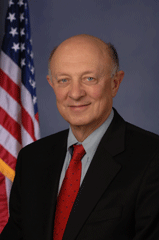
James Woolsey.
CURWOOD: From the wishes of Wall Street – to the advice John McCain has been hearing. James Woolsey was a senior arms control diplomat during the Reagan Administration and head of the CIA during the first years of the Clinton Administration. He now serves as an energy and foreign policy advisor to the McCain campaign when he’s not tending to an energy venture fund he recently joined. Mr. Woolsey, John McCain is at odds with the White House in wanting a carbon cap and trade system – what’s his thinking?
WOOLSEY: One of the reasons John McCain is a supporter of carbon cap and trade -- mandatory cap and trade system -- unlike the Bush administration, is that he takes climate change really seriously and he believes that a cap and trade system is something that will let the market work to help us find the better solutions, but at the same time exert overall pressure on reducing the amount of CO2 going into the atmosphere.
CURWOOD: In the Republican platform, there is no mention of cap and trade.
WOOLSEY: Well I think, John McCain’s commitment to this is quite clear and solid. He actually developed this concern during the 2000 campaign as a result of dialogue with some environmentalists and environmental groups. And he thought about this a lot, he went back after he lost in 2000 and worked with his friend Joe Lieberman, and they came up with McCain/Lieberman, and saw, unlike the administration, that it really had to be mandatory in order to work. I don’t think anyone should doubt his commitment to moving forward and moving forward smartly with a mandatory cap and trade system to reduce carbon emissions.
CURWOOD: So, let’s look at the Republican platform on the question of more drilling, more energy independence. It reads, and I quote, “We support accelerated exploration, drilling and development in America to new oil fields off the nation’s coast to onshore fields such as those in Montana, North Dakota and Alaska. We oppose any efforts that would permanently block access to the coastal plain of the Arctic National Wildlife Refuge.” Now, as I understand it, Senator McCain is opposed to drilling in ANWR.
WOOLSEY: He is opposed to drilling in ANWR, but I don’t think he is in favor of a permanent blockage. He wants to be able to examine the issue. He did reexamine his position on offshore drilling here some months ago, and determined that the technology had changed sufficiently since the Santa Barbara spill of now nearly 40 years ago. So, he came to the conclusion that if the adjoining state was willing, then the federal government shouldn’t be a bar to the offshore drilling, but he has not made that determination with respect to ANWR.
CURWOOD: Let’s talk about nuclear power. Senator McCain, the Republican platform, very excited about nuclear power, and frankly I’m wondering if the Senator is more interested in nuclear than he is in wind, solar and other renewable forms of energy.
WOOLSEY: I don’t think he’s more interested in nuclear, but he does believe that we are going to need some added baseload electricity, 24/7 electricity along with what we can do with renewables. Renewables, two leading ones, wind and solar, are, of course,
intermittent. One operates in the daytime, and one generally at night and at dusk. But John McCain is a strong supporter of solar and wind, geothermal, hydro, and wants to do everything possible that one can with those.
CURWOOD: Now, Jim looking at the Republican platform there’s this line saying that the Republicans, quote, “firmly oppose efforts by Democrats to block the construction of new coal fired power plants. No strategy for reducing energy costs will be viable without a commitment to continued coal production and utilization.” And yet when you talk to people on Wall Street they say the regulatory picture for coal and the questions of what the constraints will be on carbon make it very difficult to invest in coal.

James Woolsey
CURWOOD: McCain campaign advisor Jim Woolsey was President Clinton’s first director of the CIA, and also served the Reagan Administration as a senior diplomat. Thanks, Jim.
WOOLSEY: Thanks, Steve.
Related links:
- To read the Republican Party platform, click here
- To learn more about James Woolsey’s thoughts on climate change and national security, click here
[MUSIC: Zuco 103/Various Artists “Ontro Lado” from Brazil2Mil: The Soul Of Bass-O-Nova (Six Degrees 2005)]
Greening the Twin Cities

Bikers in Minneapolis get ready for a bike ride with Mayor Rybak. (Photo: Bobby Bascomb)
The twin cities Minneapolis and St. Paul played host to the Republican National Convention. In addition to some 900 lakes, the cities are renowned for their uncommon friendliness known as “Minnesota Nice.” But Living on Earth's Bobby Bascomb reports that they'd also like to be known for their “Minnesota Green.”
[AMBIENT SOUND]
BASCOMB: It's before dawn on the Minneapolis side of the Mississippi. Pillsbury and Gold Medal Flour still have mills on either side of the river here. They turn off their electric signs as the sunrise turns the sky pink and purple. Mayor R.T. Rybak, who was voted fittest mayor in America two years ago, meets with a group of 50 bikers for a 5K bike ride down the Mighty Mississippi.
WOMAN: Good morning, welcome everybody. Mayor Rybak is going to take you on a ride at 6:40.
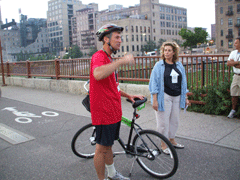
Mayor R.T. Rybak gets ready to lead a bike ride along the Mississippi River. (Photo: Bobby Bascomb)
[CROWD LAUGHS]
RYBAK: Are you guys ready? Bikers ready!
[AIR HORN BLOWS AND CROWD LAUGHS]
RYBAK: Let's go!
[CROWD LAUGHS, SOUND OF BELLS AND BIKES GOING BY]
BASCOMB: Mayor Rybak rides one of the 1,000 “free wheelin” bikes brought into the city this spring in preparation for the convention. Visitors and locals sign up for the program with a credit card but are only charged if they don't return the bike at the end of the day.
RYBAK: We have a hundred miles of bike trails in the city and putting more bikes on through the bike share will I believe create a more bike friendly city.
BASCOMB: The Minneapolis convention center, where delegates met and mingled during the day, is 10 miles from the Xcel Energy Center in downtown St. Paul where they reconvened each evening for the serious business of democracy. The trip is not exactly bikeable for most delegates in their suits or high heels. Joanna Burgos is press secretary for the Republican National Convention.

Bikers in Minneapolis get ready for a bike ride with Mayor Rybak. (Photo: Bobby Bascomb)
BASCOMB: And the DNC is encouraging people to reduce their carbon footprint. Have you talked with any about the process of getting here and their travel to get here?
BURGOS: We have a number of realistic environmental initiatives that our delegates and our visitors will see once they enter Xcel.
BASCOMB: Some of those realistic plans included 300 recycling containers at the convention. But when it came to actually using them some people didn’t quite seem to know how they worked. I asked a staff member how to recycle a plastic plate.
BASCOMB: Where can I recycle this?
MAN: I don't know, I don't even know if, oh there they are. But that's plastic bottles, paper, and aluminum.
BASCOMB: So, what's this one?
MAN: Garbage, I think. I have no idea.
BASCOMB: The RNC focused a lot of attention on greening their day-to-day operations. They used recycled office furniture and carpeting, as well as wind and solar power. Again, Joanna Burgos.
BURGOS: We’re using a lot of biodegradable materials. Our banners are biodegradable. We’re trying to use digital whenever we can instead of paper. From the beginning everything we’ve looked at it’s been, how can we make this more green?
[TRAFFIC SOUNDS]
BASCOMB: In the trendy neighborhood of Uptown Minneapolis a group of volunteers led by Maude Lovelle hit the streets to spruce up the place by picking up trash.
LOVELLE: We kind of have this huge effort today that involves business owners, there’s one of them right there painting a sign, he owns a local artist gallery.
BASCOMB: But cleaning up the neighborhood isn’t just about putting on a nice face for the Republican delegates. Lovelle says it’s just good for business.
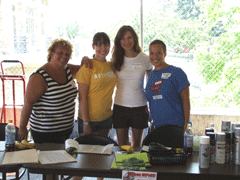
Maude Lovelle with volunteers in the Uptown neighborhood of Minneapolis. (Photo: Bobby Bascomb)
[TRAFFIC THEN SWEEPING SOUNDS]
BASCOMB: Bill Frothinger is out with his wife and two daughters sweeping up trash near a bus stop.
FROTHINGER: Finding a lot of cigarette butts. Typical debris -- wrappers, candy wrappers, pop cans. So, we’re just getting that stuff off the street making things look better, to keep things clean, yeah! It’s looking good. And it’s a beautiful day too, so we like it.
BASCOMB: So with local efforts and the good environmental choices made by the RNC, Minnesota nice might also claim the title Minnesota green.
For Living on Earth, I'm Bobby Bascomb in St. Paul, Minnesota.
Related link:
The Republican National Convention
Convention Wrap-Up
CURWOOD: So let’s bring back Living on Earth's Jeff Young for some final thoughts on the week he spent with the GOP in the twin cities. Hey there, Jeff.
YOUNG: Oh ya, you betcha, Steve. Trying to blend in here in Minnesota.
[LAUGHING]
CURWOOD: Okay, well how do you sum all of this up?
YOUNG: You know, what struck me is this shift in tone when it comes to energy and the environment issues. Instead of using this convention to, I don’t know, appeal to moderate swing voters concerned about climate change, eager to see the country move toward cleaner energy, well this has largely been a showcase for the traditional Republican energy priorities. It’s as if the gravitational pull of the Republican Party base is just too great, even for McCain the maverick to withstand. Now, of course McCain supporters like James Woolsey and Senator Joe Lieberman insist that their candidate is still committed to addressing climate change. Now we heard little -- very little -- of that message from the podium and from the delegates here in St. Paul this week. The energy message here boiled down to a simple three-word chant: drill, baby, drill.
CURWOOD: Okay, Jeff, now you spent a week with the Democrats in Denver and another with the Republicans in St. Paul. They both talked a lot about energy. What can we expect from them now?
YOUNG: Well you know, the Democrats are having their own internal struggle on energy. They’re trying to appease voter concerns on high gas prices, trying to smooth things over with Democrats from coal and oil states. And both parties are pushing this “all of the above” energy message. They want to be the ones who voters think “ah – those folks have the right balance.” But if you look just beyond that “all of the above” slogan, you see a pretty stark difference here. Despite Senator McCain’s actions on global warming in the past, and he does have a strong record here, the Republican message increasingly is one that puts the emphasis on expanding oil drilling, expanding nuclear power. Support for alternative energy and conservation is falling farther down on that agenda. Democrats largely view additional drilling as the small part of an energy strategy that instead emphasizes green jobs, the potential for renewable energy. So I think the battle lines are pretty clear here and we’re going to see that fight on the campaign trail certainly over the next sixty days, and we’re going to see it in Congress in the next few weeks as this spills over onto Capitol Hill.
CURWOOD: Living on Earth’s Jeff Young on the road home to D.C. from St. Paul and the Republican convention. Thanks, Jeff. I think you’ve got your work cut out for you back on Capitol Hill figuring out all that maneuvering. Good luck.
YOUNG: Thanks, Steve.
[MUSIC: Snowboy/Various Artists “Astralisation” from Acid Jazz Rarities (Acid Jazz Records 2004)]
CURWOOD: Living on Earth is produced by the World Media Foundation. Our crew includes Ashley Ahearn, Bobby Bascomb, Eileen Bolinsky, Bruce Gellerman, Ingrid Lobet, Helen Palmer, Mitra Taj and Jeff Young, with help from Sarah Calkins and Marilyn Govoni. Our interns are Sandra Larson and Jessie Martin. Special thanks this week goes to PRI’s Heidi Shulz. Jeff Turton is our technical director. Alison Lirish Dean composed our themes. You can find us anytime at loe.org. I’m Steve Curwood. Thanks for listening.
ANNOUNCER: Funding for Living on Earth comes from the National Science Foundation, supporting coverage of emerging science, and Stonyfield Farm: organic yogurt and smoothies. Stonyfield pays its farmers not to use artificial growth hormones on their cows. Details at stonyfield.com. Support also comes from you our listeners, the Ford Foundation, the Town Creek Foundation, and the Oak Foundation supporting coverage of climate change and marine issues; The Rockefeller Foundation and its Campaign for American Workers. More at rockfound.org. And Pax World Mutual Funds: socially and environmentally sustainable investing. Pax World: for tomorrow. On the Web at paxworld.com.
ANNOUNCER: PRI, Public Radio International.
Living on Earth wants to hear from you!
Living on Earth
62 Calef Highway, Suite 212
Lee, NH 03861
Telephone: 617-287-4121
E-mail: comments@loe.org
Newsletter [Click here]
Donate to Living on Earth!
Living on Earth is an independent media program and relies entirely on contributions from listeners and institutions supporting public service. Please donate now to preserve an independent environmental voice.
NewsletterLiving on Earth offers a weekly delivery of the show's rundown to your mailbox. Sign up for our newsletter today!
 Sailors For The Sea: Be the change you want to sea.
Sailors For The Sea: Be the change you want to sea.
 The Grantham Foundation for the Protection of the Environment: Committed to protecting and improving the health of the global environment.
The Grantham Foundation for the Protection of the Environment: Committed to protecting and improving the health of the global environment.
 Contribute to Living on Earth and receive, as our gift to you, an archival print of one of Mark Seth Lender's extraordinary wildlife photographs. Follow the link to see Mark's current collection of photographs.
Contribute to Living on Earth and receive, as our gift to you, an archival print of one of Mark Seth Lender's extraordinary wildlife photographs. Follow the link to see Mark's current collection of photographs.
 Buy a signed copy of Mark Seth Lender's book Smeagull the Seagull & support Living on Earth
Buy a signed copy of Mark Seth Lender's book Smeagull the Seagull & support Living on Earth

